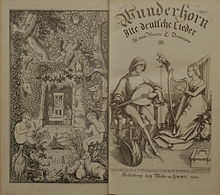Des Knaben Wunderhorn
The collection of love, soldiers, wandering, and children's songs was an important source of idealized folklore in the Romantic nationalism of the 19th century.
Arnim and Brentano, like other early 19th-century song collectors, such as the Englishman Thomas Percy, freely modified the poems in their collection.
Publication of the collection took place during the War of the Fourth Coalition, in which Napoleon achieved what seemed at the time a decisive military victory and established a complete French dominance over Germany.
Selected poems from this collection have been set to music (Lieder) by a number of composers, including Weber, Schubert, Loewe, Mendelssohn, Schumann, Brahms, Zemlinsky, Schoenberg, Zeisl and Webern.
Between 1887 and 1901, he wrote two dozen music settings for Wunderhorn texts, several of which were incorporated into (or composed as movements for) his Second, Third and Fourth symphonies.


